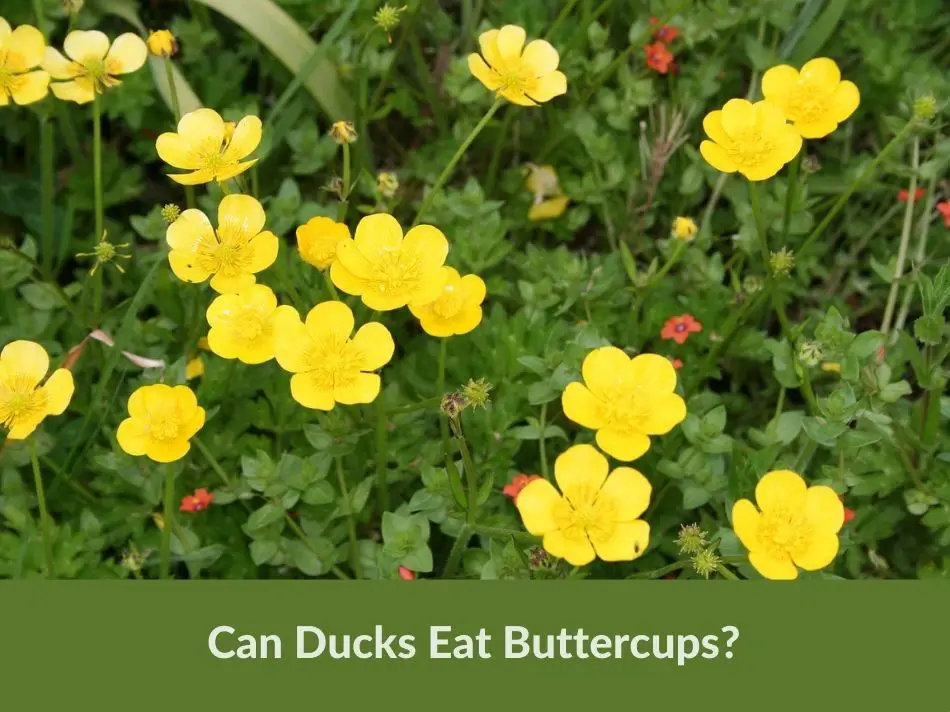A duck’s natural diet is diverse, including aquatic plants, small fish, insects, and a variety of seeds and grains. They are known to graze on grass, pick up insects, and forage for small crustace ensureeans in shallow waters. But, can ducks eat buttercups?
No, ducks should not eat buttercups. Buttercups contains toxin called ranunculin, which can convert to protoanemonin. This compound can cause reduced appetite, lethargy and digestive distress.
In this article we will take a closer look at ducks eating buttercups and the negative effects that comes with it. We also have some recommended alternatives to buttercups that ducks safely can eat.
What are Buttercups?
Buttercups belong to the genus Ranunculus, which comprises over 500 species of flowering plants. These flowers are most commonly recognized by their distinctive glossy yellow petals, though some species might have white, orange, or red blossoms.
Buttercups often flourish in damp environments, such as near ponds, lakes, or in wet meadows. Their name is believed to have originated from the mistaken belief that the bright yellow color of some buttercups was responsible for the yellow tint of butter.
In addition to their aesthetic appeal, buttercups have been utilized in traditional medicine and folklore. Yet, despite their beauty and historical significance, many species of buttercups contain the toxic compound ranunculin, which, when crushed or consumed, can convert into the irritant protoanemonin.
What Is Ranunculin And Protoanemonin?
Ranunculin is a glycoside naturally found in buttercup plants. This compound, in its undisturbed state, is relatively benign. Yet, when the plant becomes crushed, chewed, or otherwise damaged, ranunculin undergoes a transformation, breaking down into a more reactive compound: protoanemonin.
Protoanemonin is the compound responsible for the buttercup’s acrid taste and its potential harmful effects on many animals. Chemically, it’s an unsaturated lactone, and its potency can vary depending on the specific species of buttercup.
When consumed, protoanemonin can serve as an irritant to the mucus membranes, and it’s this characteristic that brings about the majority of its observed effects in animals.
Effects on Ducks
For ducks, ingestion of significant amounts of protoanemonin can have pronounced effects:
- Digestive Disturbances: One of the most immediate effects on ducks consuming a substantial amount of buttercups is irritation of the digestive tract. This irritation can manifest as discomfort, prompting the duck to eat less, or potentially lead to more severe digestive problems.
- Lethargy: Protoanemonin can sap a duck’s energy. A duck that has consumed a notable amount of buttercups might appear less active, spend more time resting, and display a general lack of enthusiasm for activities it would otherwise engage in.
- Reduced Appetite: The bitter taste, combined with the irritation caused by protoanemonin, can deter ducks from eating. A reduced appetite might not only stem from the immediate taste or discomfort but also from a learned aversion if the duck associates the unpleasant sensations with buttercups.
Other Flowers Ducks Can Eat
Ducks can safely consume a variety of flowers, which offer them essential nutrients and variety in their diet. Many gardeners and duck owners often wonder which flowers are safe to feed to their feathered friends and below are a few flowers that are safe for ducks to eat:
Be sure to explore our comprehensive list of plants and flowers suitable for ducks.
Conclusion
While ducks may occasionally consume buttercups without immediate harm, it’s evident that these plants are not an optimal dietary component. Monitoring the environment and diet of ducks to reduce the presence or consumption of buttercups will contribute to the health and well-being of these birds.
Disclaimer: The information in this article is for informational purposes only. I'm not an expert or a veterinarian.


